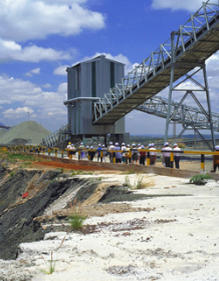|
Getting your Trinity Audio player ready...
|

Dear Corruption Watch,
A mining house in Kenya is considering bringing a bribery case to the International Chamber of Commerce. They allege that they were asked to pay just under $1 million to reverse a suspension of its mining licence. The company claims the suspension was politically motivated. Is this common in the mining industry? What do South African companies do when their regulators ask for bribes?
Perplexed
Dear Perplexed,
The mining industry in Africa has been in the spotlight over the last year with the emergence of serious allegations of corruption and impropriety in the awarding of mining licences. In many cases, the real perpetrators are never brought to book, however, this seems to be changing.
In Kenya, the new Mining Cabinet secretary, Najib Balala, revoked a number of mining licences previously awarded to mining companies. He claimed that the licences were issued irregularly during the country’s political transition. Balala maintains that the suspension of the licences was part of a broader strategy to ensure Kenya receives a bigger share of earnings from its mining sector.
Senior officials from one of the biggest companies affected, Cortec Mining Company, have alleged that Balala contacted them to demand 80-million shillings (R9.3-million) in order for the company to keep its licences for the exploration of niobium. Balala has denied any impropriety, but if the allegations are true, it would be a serious abuse of power at the highest level and cast a shadow over Kenya’s mining industry. Cortec have threatened to fight the matter both in the domestic courts, and if necessary, in international arbitration forums.
Similar allegations of corruption emerged earlier this year in Guinea after mining company, BSG Resources, was awarded the coveted licence to the Simandou mine which contains the world’s largest undeveloped iron-ore deposit. FBI investigations revealed that millions of dollars had been paid in bribes to government officials and the wife of the president at the time. BSGR admits that it once had a relationship with the agent responsible for the payments but denied that there was anything improper about the manner in which it obtained the mining rights. Unlike the Kenyan case, these corrupt acts fell under the American Foreign Corrupt Practices Act which meant that the responsible agent faced criminal charges for his conduct in the US. The new Guinean government has threatened to strip BSGR of the licence.
It is good to see that business in Africa is starting to say no to corrupt government officials, and that African leaders are taking steps to punish companies that undertake corrupt practices to obtain licences. In the clamour for lucrative mining licences, many companies are unwilling to name and shame government officials because of their influential position in their country’s mining sectors and the potential for political fall-out. This seriously hinders the fight against corruption in this sphere. It is the lack of accountability and transparency in the licensing process and dishonest government officials that allows corruption to filter into the industry. The real impact is felt by the citizens of these countries who wait to receive any benefit from the wealth beneath their soil.
South Africa has also faced the struggle with corruption in the process of issuing mining licences. In particular, the major on-going dispute between ICT and Kumba Iron Ore, and the Department of Mineral Resources, revolves around alleged corruption in the award of the Sishen mining licences.
In 2010 the Department of Mineral Resources under Minister Susan Shabangu implemented a six-month moratorium on mining licences in order to thoroughly review the process. The department introduced an online application system which ensures greater transparency and consistency in the process of allocating prospecting rights, mining rights and mining permits. The process remains vulnerable as every application must be considered by an adjudicator and these officials will inevitably be subject to pressures from various spheres. It is vital that mining companies report corrupt government officials and that government officials do likewise with respect to corrupt mining companies and their employees. Our strong regulatory framework is of no use unless it is properly, fairly and transparently implemented.







